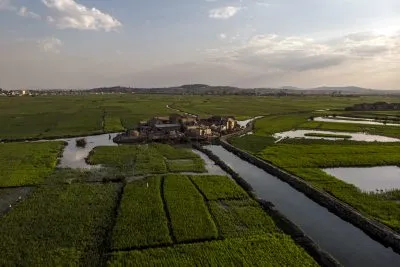Landlocked in a region beset by Islamist militancy, civil conflict, and the mass flow of refugees, Chad has long relied on effective diplomacy to ward off the dangers of its unstable Central African neighbourhood.
Whether building a military alliance against Boko Haram with Nigeria, hosting French troops on manoeuvres in the Sahel, or dealing with the problems of Libya’s unstable southern border, the country has energetically pursued a role as a trusted security partner under the foreign ministry of Moussa Faki Mahamat.
In January, that experience proved the decisive factor in catapulting the little-known Mahamat – a one-time Chadian prime minister and staunch ally of President Idriss Déby – to the surprise leadership of the African Union Commission, arguably the continent’s most important diplomatic post.
For many analysts, Mahamat’s election victory offers a chance to inject renewed vigour into a moribund African Union, and in particular a security mandate that lay dormant under the cautious leadership of South African predecessor Nkosazana Dlamini-Zuma.
“Mahamat’s election is meant to usher in a new era for the AU and to signal a clear break with the past under Dlamini-Zuma,” says Robert Besseling, political analyst at ExxAfrica.
“The primary focus will be security. A stronger response to Boko Haram, which continues to pose a threat in the Lake Chad region, may be a priority.
Other conflicts or disputes on which Dlamini-Zuma has been much criticised are the crises in DRC and Burundi. Mahamat is expected to take a stronger stance and may support regional or multilateral intervention.” Drawing on his extensive range of security and diplomatic contacts throughout West and Central Africa, harvested over nine years shaping Chad’s foreign policy, Mahamat could push for greater security and anti-terrorism cooperation among member states and a more assertive role for the AU’s African Standby Force, the pan-continental peacekeeping army set up to tackle security crises.
The prevailing outlook on the continent suggests a growing appetite towards such intervention. In January, troops from the Economic Community of West African States played a crucial role in bloodlessly dislodging Gambia’s Yahya Jammeh following his refusal to step down after a comprehensive election defeat.
That intervention appeared to signal a growing willingness among some African states to act against recalcitrant autocrats. “Many African leaders have been reluctant to agree to Western involvement in the region, yet do support regional or AU-led interventions,” says Besseling.
Yet while hawkish supporters of Mahamat may point to the Gambian intervention as a potential template for a more forceful AU policy, any plans to significantly ramp up military operations are likely to face resistance among countries opposed to interference in the internal affairs of sovereign states – a still-prevalent attitude summed up by the AU’s divisive debate about withdrawing its members from the International Criminal Court. While the eccentric Jammeh had long alienated and embarrassed fellow African leaders with his erratic behaviour, intervention against more diplomatically astute African governments is likely to prove a non-starter.
“Even though you have an agenda for reform you’re tied by what member states want to push for,” says Valentin Robiliard, associate analyst for Africa at Control Risks. “The AU may be more proactive when it comes to South Sudan and other crises.
“Whether that will affect crises further away from Chad’s strongholds remains to be seen. The realist approach to intervention is there but all the member states have their own issues – I don’t think you’ll see overnight an institution which will intervene in all conflicts on the continent.”
Constraints
Two trends ensure that Mahamat is unlikely to have the freedom to rebuild the African Union in Chad’s security-conscious image. The first is the delicate circumstances of his election. According to analysts, the Chadian emerged as a compromise candidate between East and West Africa in a bid to avoid the widespread acrimony of Dlamini-Zuma’s 2012 coronation, which violated an unwritten convention barring larger powers from leading the Commission and led to furious accusations of South African bullying.
As a result, Mahamat’s room for manoeuvre is likely to be constrained by the fragile web of alliances that underpinned his more consensual victory. The second and more significant constraint is the nature of the organisation itself.
Power in the African Union has long been vested not in the Commission and its chair, but with the member states of the Assembly whose instructions the Commission is obliged to carry out. Without the say-so of the member states, the Commission is virtually powerless to run an independent agenda, whether on the key issues of security, regional integration or development.
“The African Union Commission chair exercises no powers, no authority whatsoever, and because of that it will be very difficult to expect miracles from anybody in that position,” says Babatunde Fagbayibo, associate professor of law at the University of South Africa.
“There’s a lack of political willingness, a lack of understanding of where we want to take the AU. The tendency is to create committees and frameworks but governments are not addressing the elephant in the room.”
Previous attempts to reform the organisation have been repeatedly thwarted. A 2007 audit by a high-level panel found that the Commission suffered from defective management, failures in finance and recruitment, and was focused on too broad a range of activities.
In January, President Paul Kagame of Rwanda, commissioned to compile another report, argued that a “chronic failure to see through African Union decisions had resulted in a crisis of implementation and a perception that the AU was not relevant to Africans.”
Need for reform
It remains to be seen whether Kagame’s report will join the 2007 audit in the long grass, or whether it will provide Mahamat with an opportunity to drag the AU out of another stretch of institutional inertia. If the continent is to have any hope of achieving either security reform or the lofty goals set by Agenda 2063, the AU’s holistic plan for African development, analysts agree that the Union must be recast.
“The limitations which prevented Dlamini-Zuma from being more effective, be it around the budget, or a divided continent with self-interested states, are still there. It was an issue for her and will be an issue for him even though there might be greater will and capacity in terms of networks and previous experience,” says Robiliard.
Even for one with extensive military experience, tackling such entrenched interests could prove a bridge too far, says Besseling. “AU reform is a huge task and I doubt that Mahamat will have the political capital to instigate this in the early years of his mandate – after all he is a compromise candidate between East and West.”
David Thomas
Want to continue reading? Subscribe today.
You've read all your free articles for this month! Subscribe now to enjoy full access to our content.
Digital Monthly
£8.00 / month
Receive full unlimited access to our articles, opinions, podcasts and more.
Digital Yearly
£70.00 / year
Our best value offer - save £26 and gain access to all of our digital content for an entire year!
 Sign in with Google
Sign in with Google 


